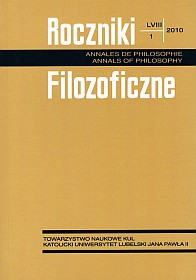The Cartesian Conception of the Union of the Mind and the Body – On the Basis of Margaret D. Wilson’s Interpretation
Abstract
The subject of the text is the problem of the mind’s effect on the body in Margaret Wilson’s interpretation. Part I presents Margaret D. Wilson’s interpretation of the Cartesian dualism against the background of the debates on dualism conducted in Anglo-American philosophy as well as that of debates that were contemporary to Descartes. In Part II Descartes’ argument is presented for the distinction of the soul and the body on the basis of analysis of cogito (epistemological argument). In Part III the problem of the soul’s effect on the body is defined from the point of view of the conception of the role played by sensual perception. In the final chapter it is stated that Descartes’ position ranges from the Natural Institution Theory to the Co-extension Theory. Margaret D. Wilson herself is in favor of the former conception of the Cartesian understanding of the relation between the soul and the body, according to which sensual perception is an argument for the union of the soul and the body on the strength of the union instituted in a natural way by God. In the conclusion it is stated that the Natural Institution Theory – albeit not free from problems – is a more comprehensible explanation of the relations between the soul and the body, whereas by using the Co-extension Theory Descartes, even though he wants to ensure a close union of the soul and the body, does not give a clear solution, and what is more, he exposes his position to contradiction.
References
Wilson Margaret Dauler: Descartes. The Arguments of the Philosophers, Edited by Ted Honderich, London and New York: Routledge 1993.
Copyright (c) 2010 Roczniki Filozoficzne

This work is licensed under a Creative Commons Attribution-NonCommercial-NoDerivatives 4.0 International License.





